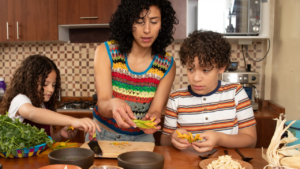Living life on a budget, another statement for living within one’s means, is not a walk in the park. It can however be done.
As long as I can remember, especially as a married woman, I’ve always lived on a budget. God has faithfully supplied what we needed and not necessarily what we wanted.
I hence had to learn to operate within what he supplied to us as a family, knowing that as long as our primary needs are supplied, (Food, shelter, clothing, health, and let me add transport) we’re good to go.
I want to discuss some key principles I strive to live by as I trust the Lord to guide me in maintaining a budget-friendly lifestyle.
I am not perfect, and this journey is not always easy, but I hope that by sharing, I can be a blessing to someone—especially a homemaker who is seeking to live within their means while trusting God for provision, perhaps even an extra source of income.
If you’re new to my content, I am a stay-at-home work-from-home homeschooling mom who is passionate about matters womanhood, hospitality, discipleship, and budget-friendly living, all from a biblical perspective.
My goal is to align with God’s will for my life as a homemaker and to share what I learn along the way.
In today’s post, I’m sharing practical ways I apply faith based principles in my daily routine, that facilitate budget-friendly living for our family.
I pray these principles will inspire you towards living the life God ordained for you this season with what he has provided.
-
Working with a Budget
One of the most crucial principles I follow is working with a budget.
While I may not be an expert in financial planning, nor am I rigid in planning for our resources, I trust the Lord to help me wisely allocate our resources.
Before we spend, we prayerfully plan where each shilling should go, ensuring that our needs are met first before considering any extras.
Our budget has been tight this season, perhaps more than any other season.
Our groceries shopping list includes vegetables and one or two kinds of fruit that are in season that I buy at the farmer’s market, (they’re cheaper there in our country) plus 3 animal proteins which include beef, (that we now eat once a week) eggs, and milk.
A while ago we put a pause to buying other kinds of protein such as chicken, fish, sausage, pork, etc. until “further notice.” I’ll explain this further in the next point. Once in a while we will buy depending on our supply. On the whole though, these are off our budget for now.
This discipline has helped us cultivate contentment and train our children (whose understanding of budgeting is still not mature) to be satisfied with what we have.
Budgeting also means setting boundaries. If we realize that our expenses are exceeding our income, we adjust our spending rather than go into debt, something my husband as the head of our home is careful not to get into.
Since we live by faith, our income fluctuates, but by keeping a disciplined budget, we avoid financial stress and continue serving the Lord with peace of mind.
-
Minimizing Expenses
Closely related to the previous point is that, we try to minimize our expenses as much as possible.
In these tough economic times, reducing expenses is a necessity.
One practical step we have taken is limiting our consumption of expensive foods. For example, like I mentioned before, we now eat beef only once a week instead of two or three times.
We also maximize what we have at home—thankfully, we live on a farm, where we grow foods like maize, potatoes, kales, loquats, cabbages, macadamia, custard apple, and arrow roots). Planting and harvesting our own produce greatly reduces grocery expenses.

Another strategy is buying in bulk and preserving food. We boil large amounts of green maize and store it in the freezer for future use. Leftover food is creatively repurposed to avoid waste.
For instance, when we make kachumbari (salsa), any leftovers are cooked into a sauce for use in sandwiches.
Recently, I also made a simple vegetable sauce, cut my leftover ugali, a Kenyan meal that can be tricky to repurpose, into small pieces, and mixed it in the sauce. It turned out to be a sumptuous delight for my people.
-
Learning to Make Rather Than Buy
Acquiring new skills has been a game changer in our budget-friendly journey.
I keep learning skills to make rather than buy store bought items we need.
For instance, instead of buying cheese, I have learned to make homemade mozzarella and cream cheese. Cheese is quite expensive in our country, but by making it at home, we enjoy it at a fraction of the cost.
I’m yet to learn how to make other cheeses but I have learned to use the two cheeses I know to make for recipes that might require other kinds of cheeses. The result may not be the same but we do enjoy those recipes!
Additionally, I make homemade all-purpose liquid soap and hand wash, a much cheaper option than store-bought soap.
Another skill we’ve learned is bread making. We make bread at home. Most of our snacks are also homemade.
These small efforts accumulate over time, significantly reducing our household expenses.
Teaching my daughters practical skills is also part of this journey. They are learning to knit and crochet. They’ve even began selling the products they produce from these skills. These skills not only save money but could also provide an extra source of income.
-
Cooking from Scratch
Buying pre-packaged or restaurant food is costly, so I cook most of our meals from scratch.
Preparing homemade bread, pancakes, and even yogurt ensures that my family eats healthier while saving money.
One of our staple recipes is sourdough bread. I use simple ingredients like sourdough starter, flour, eggs, and whey (leftover from making cream cheese) to make nutritious, filling bread for the week. You can find one of our Sourdough bread recipes here.
Similarly, we bake homemade rolls like cinnamon rolls, which are far more affordable than store-bought alternatives.
A single family meal at a restaurant often costs us as a family the equivalent of 3 or so days’ worth of home-cooked meals.

At the writing of this post, my family can’t remember when we last visited a restaurant as a family. Does this mean we will never visit a restaurant? Of course not! We most likely will, but not as long as we are on a fairly tight budget.
-
Simplifying Our Lifestyle
One of the most valuable lessons I have learned from my husband is the importance of living simply.
Instead of chasing after material wealth, we focus on what truly matters—faith, family, and stewardship.
Simplifying our lives means decluttering, avoiding unnecessary purchases, and finding joy in simple pleasures.
We use firewood and charcoal produced from bushes on the farm to boil our water and foods that require a long time to boil.
We do not feel pressured to keep up with trends or buy expensive brands. Instead, we trust God to provide quality secondhand items when necessary.
Teaching our children to be content with what they have rather than longing for luxury items helps shape their character and financial habits. They have also learned to trust God for what they’d like to have outside the budget.
-
Plan Errands Wisely to Save Time and Money
Being intentional about how we run errands is a simple yet effective way to steward our resources well.
Now that we live farther from town, we’ve learned the importance of consolidating our trips to minimize expenses.
Instead of making multiple journeys, we plan ahead and ensure that everything that needs to be done is accomplished in one trip.
This practice not only saves on fuel or transport costs but also reduces time spent on the road, allowing us to be more present at home.
Proverbs 21:5 reminds us, “The plans of the diligent lead surely to abundance, but everyone who is hasty comes only to poverty.”
Thoughtful planning helps us avoid unnecessary spending and make the most of what we have.
Whether it’s grocery shopping, banking, or other errands, taking the time to organize trips wisely contributes to a budget-friendly lifestyle.
By being good stewards of our time and finances, we can create a more peaceful and efficient home, honoring God with our resources.
-
Practicing Giving, Saving, and Investing
For a long time, I was not good at saving. However, I have learned that even small amounts set aside can grow into something substantial over time.
My husband has always been disciplined in saving, and I am grateful for his example. Now, I make it a habit to consistently save part of my pocket money as a wife and trust God to multiply our resources.
This saving little by little, sometimes for over a year, has helped me purchase household items such as a freezer, beef grinder, and blender/ grinder that have facilitated my from-scratch cooking journey.
I was pleasantly surprised when my little savings covered the down payment for a book I needed to publish!
Don’t ever take for granted that 5 to 10-dollar monthly saving habit. God will multiply this for his glory.
Investing is another area where I have gained insight. Initially, I thought that investment required large sums of money, but I have discovered that even small investments can grow.
From my sharing so far, you can tell I have been educating myself financially the past few years.
I have been intentional about investing, and I encourage other homemakers to start, no matter how little they have.
My little savings above for instance, all go to an investment account rather than a savings account.
Giving is also crucial. We trust that as we bless others, God will continue to provide for us. Whether it is sharing food, helping a neighbor, or giving faithfully to God’s work, generosity aligns with biblical principles and brings joy.
-
Trusting God for Provision
Ultimately, our ability to live a budget-friendly life depends on our faith in God. He is our provider, and as we steward our resources wisely, we trust Him to meet our needs.
Daily fellowship with God gives us wisdom and peace in our financial decisions.
God also gives us creativity as he opens our eyes to new ways to raise finances for our family.

4 years ago, as I prayed for financial provision in light of the Proverbs 31 passage, God led me to start a YouTube channel. Later he led me to start a blog on our website.
Part of our bills, albeit in a little way as per now, are paid through income from the channel. The blog is also gaining traction resources wise. I trust that over time, God will use it to supply part of our needs.
These ideas came as I waited on God for creativity in provision.
My husband plants hay for sale. We recently invested in beehives. We will harvest honey soon and sell some to boost our income.
We also cleared part of our bushes on the farm as a requirement from the area leadership to keep dangerous wild animals at bay.
We turned the twigs from the bushes into charcoal. We sold a huge portion of the charcoal to supplement our income.
Are you praying concerning your financial situation? As you seek to live within your means, I believe God will lead you, opening your eyes to a God ordained idea to meet your needs.
I’m convinced that part of why God will often supply far beyond our means is so He might use us as channels to give towards his work, to meet the needs of those around us, and to provide a conducive environment for his purposes to thrive in a deeper greater wider way.
Final Thoughts
Living a budget-friendly life as a homemaker requires faith, discipline, and creativity.
By budgeting, minimizing expenses, learning new skills, cooking from scratch, simplifying life, saving and investing, wisely planning errands, and trusting in God’s provision, we can steward our resources well while living within our means.
I hope these principles encourage you in your own journey toward financial wisdom and contentment.
If you have any additional tips or experiences to share, I would love to hear from you in the comments. May the Lord bless your efforts as you seek to honor Him through wise stewardship!
Recommended:
The Power of a Morning Routine: How Starting Your Day Right Leads to Greater Impact as a Christian
Living a Budget-friendly Life: 8Faith Based Principles for Homemakers
Why Rising up Early is Biblical: Tracking the Proverbs 31 Woman Series
7 Reasons Why you Need to Rise up Early: Tracking the Proverbs 31 Woman Series
7 Rhythms and Routines of the Noble Woman: Tracking the Proverbs 31 Woman Series
Are there Cracks in your Spiritual Foundation? 4 Reasons Why your Spiritual Foundation is Weak
6 Components of our Spiritual Foundation

